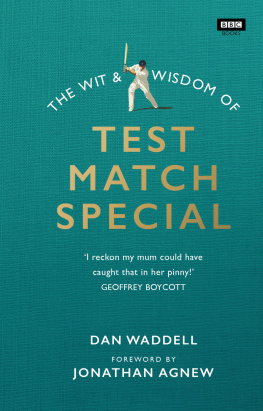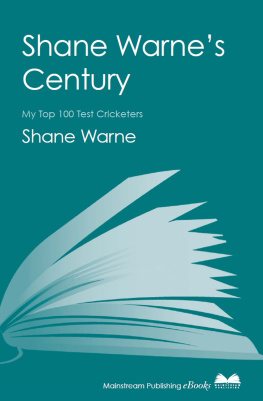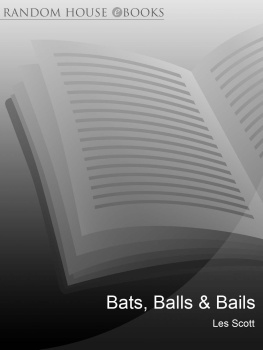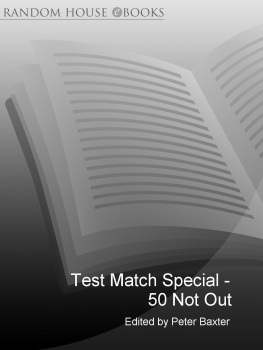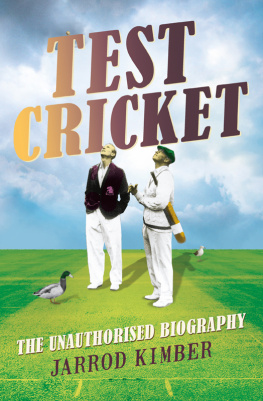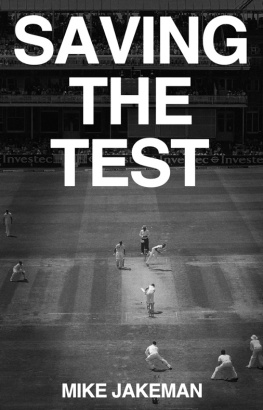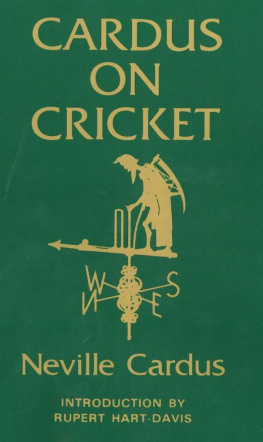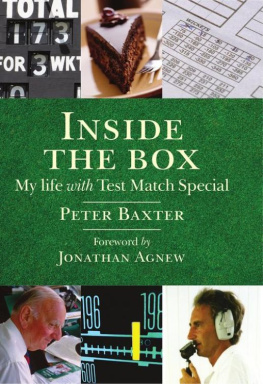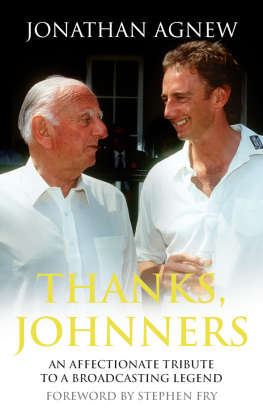CONTENTS
About the Book
For over fifty years, Test Match Special has provided the soundtrack to many cricket fans lives now this book collects its greatest hits.
Here are all the witty sayings, bons mots, doubles entendres, wise words and priceless moments from the whole TMS team past and present, and of course their many and varied celebrity guests. Whether its classic Test moments or hilarious asides from the boundary, youll find the perfect line for every occasion. Collecting over half a century of quips and quotes, and beautifully illustrated throughout, The Wit and Wisdom of Test Match Special is a cricket fans indispensable guide to bats, bowls, beards and bakes.
About the Author
Dan Waddell is a journalist, novelist and author. He covered two seasons of county cricket for the Daily Telegraph and his books include Who Do You Think You Are? and Field of Shadows: The Remarkable True Story of the English Cricket Tour of Nazi Germany, 1937. He captains Acton 2nd XI in the Middlesex County League where he tries and fails to pass on sage advice to young players.
Jonathan Agnew had a successful career as a fast bowler for Leicestershire and played three Tests and three One-Day Internationals for England. For over twenty years he has been presenter of Test Match Special, commentating and reporting on the England cricket team around the world. In 2010 he was named Best Radio Broadcaster of the Year.
FOREWORD
BY JONATHAN AGNEW
Life is full of crossroads. We have all encountered them along the way. Do I turn left or right? Take a chance with that job or stay where I am? Marry this person, or not? And those decisions are not merely restricted to the human race. Even the longest-running radio sports programme in the world has to confront challenges in order to survive in a rapidly changing environment.
The greatest threat to Test Match Special reared its head in 1992 when its faithful Radio 3 Medium Wave frequency, 1215 MW, was sold under government legislation to Virgin Radio. For one summer, Test Match Special shared Radio 3s FM frequency but it was not a happy relationship not least because of the impending launch of Classic FM. Despite sounding wonderful in glorious stereo for the first and only time in its long history, TMS could not continue on Radio 3 and the following summer, the Ashes of 1993, we sat very uncomfortably on the fledgling Radio 5 along with musical jingles, breaks for news on weekdays and competition from other sports on weekends. It was not quite the case of reading out racing results between overs, but as we worked that summer we quickly realized that this signalled the likely future for Test Match Special and, therefore, its immediate demise. It would have been the end long before Geoff Boycott ever appeared on the programme.
A crossroads had been reached and a choice had to be made. Continue straight ahead for Radio 5, turn right for the maverick but well-intended option of a private radio station funded by Sir Paul Getty, the oil billionaire and close friend of Brian Johnston, or finally recognize that a thoughtful speech programme renowned for its wit and wisdom belonged all the time on Radio 4, which had the option of splitting its emergency Long Wave frequency from its regular programming and offer us a new home. Politically, it was not a straightforward decision and some compromises had to be agreed. But Test Match Special made that crucial left turn that not only guaranteed its day-today survival, but being under the Radio 4 umbrella it ensured that we were a model Radio 4 programme: containing speech, gentle humour, intelligence and that unhurried feeling that is such a key element to cricket commentary.
The decision by the England and Wales Cricket Board to take cricket off BBC television screens in 1999, and then from terrestrial television altogether in 2006, might still have damaging consequences for the game but it has been to Test Match Specials benefit in terms of the burgeoning audience and, because of the reach of the programme, its role in the game. More people listen to TMS now than ever before, including on digital radio via 5 Live Sports Extra. The internet allows us to broadcast all over the world (when crickets authorities permit) but while Johnners might not recognize some of what we do now and how we do it, the abiding principles of a very individual radio programme that touches millions of people remain.
The secret is communication; the unique ability of radio to reach out and touch someone in a way that television never can. There is something very intimate about listening to cricket commentary through earphones in the depths of a winters night. We transport you to distant places across the globe where the sun is always shining and England are playing cricket. Of course everything is marvellous; we must never disappoint or shatter the illusion that everything is never anything but wonderful. It is a small price to pay for the privilege of enjoying such a close relationship with our listeners.
They are a loyal bunch, the TMS faithful, who know as well as anyone what makes the programme tick, who they like to listen to and who they do not and why. Diversity, therefore, is very important when it comes to picking the Test Match Special team for every match. We need a combination of voices, backgrounds and character, all of which provide a balance to the programme and give something to everyone. The same procedure is applied to our many and varied guests, who have become such an important part of TMS. In those dim and distant days before Radio 4 LW, the only interval that required to be filled was Saturdays View from the Boundary. Otherwise, every lunch and tea break, we would hand back to the studio and leave it to them. Those slots have become my favourite aspect of the programme. The commentary is the nuts and bolts, of course, but nowhere else on the BBC is there the opportunity to conduct interviews with the Prime Minister, with Lily Allen, Elton John, Colin Montgomerie or Alice Cooper (Geoff Boycott famously said: Nice to meet you, Alice to Mrs Cooper) that last for a full, uninterrupted half-hour with nowhere else to go. Those chats help lend TMS the genuine feeling of friendship, goodwill and the love of cricket that unites us all.
Carrying the TMS baton is something I never take lightly. The history and the traditions of this unique programme are too special for that. And, like the cricketers whose successes and failures we are describing through our open commentary box window, we are responsible for ensuring that future generations can experience the broadcasting phenomenon that is Test Match Special.
Jonathan Agnew, 2015
HOWARD MARSHALL: The total Huttons total, 332. It sounds like the total of the whole side. The England total 707 for 5, and the gasometer sinking lower and lower. Heres Fleetwood-Smith again to Hutton. Hutton hits him. Oh, beautiful stroke! Theres the record

